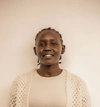Grace Majot
Empowering women to use their voices

Tales of Courage is a series that speaks about the power of education as a tool for transformative change in the world. They are told through the lens of Mastercard Foundation Scholars and Alumni. Here is Grace’s story.
Born in a war zone in South Sudan, Grace faced many challenges growing up. Due to her father’s inability to pay her mother’s bride price, in accordance with tradition, Grace’s family faced many challenges for a long time, impacting her and her siblings’ education and livelihood. Because the bride price was not paid, the relationship between Grace’s father and his in-laws broke down.
This began to affect his means of survival and supporting his household, which was by building boats at the lake. Grace’s mother was not spared from the consequences of her decision to marry her father, which was against her family’s wishes. This forced Grace’s family to leave their community and become refugees, in search of a better and safer life.
Grace and her family eventually moved to the Kakuma refugee camp in Kenya in 2006. They moved to the Kiryandongo Refugee settlement in Uganda and were given tents for houses, utensils, and food. There, Grace and her family found a new sense of stability as the place was secure and the refugees were protected. Grace maintained a cheerful disposition and integrated smoothly with the different nationalities present at the camp. She was soon noticed by the Red Cross and was selected to work with traumatized children. In 2014, she was chosen to go to Hotel Africana to advocate for child rights in Kampala.
In 2020, Grace returned to South Sudan and undertook her Senior 4 (secondary school exam) as it proved to be the optimal pathway to accessing opportunities, given the challenges faced by individuals with foreign certificates when seeking employment in her home country.
Grace excelled in high school, after which the high school employed her. Her earnings were used to pay the school fees of her siblings. In the meantime, she occupied herself with many different community associations because she embodied the spirit of service, and one of her dreams has always been to give back to her community through social service. Grace was sworn in as the Secretary of Education and Health Affairs for the Adoor Youth Development Association (AYDA), a community association with the aim of solving challenges faced by the youth in all aspects, including education. Upon completing her studies, she once again faced a setback when she discovered that her chances of enrolling at the university were limited because there was no one to pay her tuition fees. She then heard about the African Leadership University in Rwanda (ALU-Rwanda), applied, and was accepted into the Mastercard Foundation Scholars Program at the university.
It is difficult having family members who didn’t go to school. They will never teach you what your future is like.
Grace is pursuing a Bachelor of Entrepreneurial Leadership and is grateful for the support she received from the Mastercard Foundation Scholars Program. She uses a portion of her stipend to support her siblings’ education. She especially appreciates the community and environment at ALU-Rwanda. In addition to supporting her siblings, Grace supports Dak, a fellow Mastercard Foundation Scholar who is also a refugee, with his initiative to support refugees applying to the Mastercard Foundation Scholars Program.
“We need to first build ourselves. I have many ideas, and even though I haven’t implemented them, I know I will have to do them someday,” Grace adds.
She is also a women empowerment activist and aims to improve herself to serve as an agent of transformative change in her community. She is building on the lessons she has learned from using community at ALU Rwanda to solve problems. The Pan-African nature of ALU-Rwanda has opened Grace’s eyes to the importance of unity in solving the divisions brought about by wars in her home country.
Fueled by her passion for education, Grace aims to create an initiative to empower and bring women from all South Sudanese states together to share their voices.
“Women’s voices are being silenced, and we want to help them support their daughters. Once we bring people together and teach them about cultural adjustment, they will drop all their differences and focus on learning more about others, promoting a peaceful and friendly environment,” says Grace.





